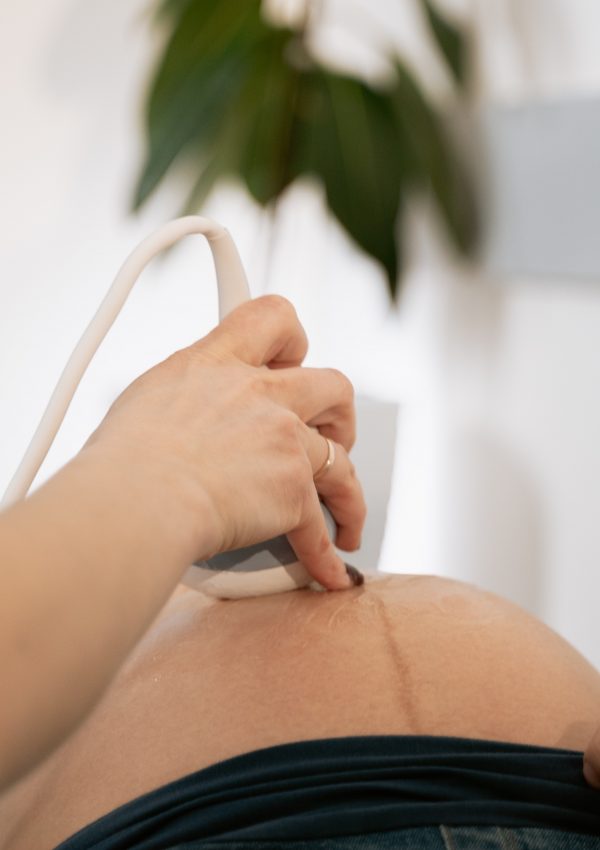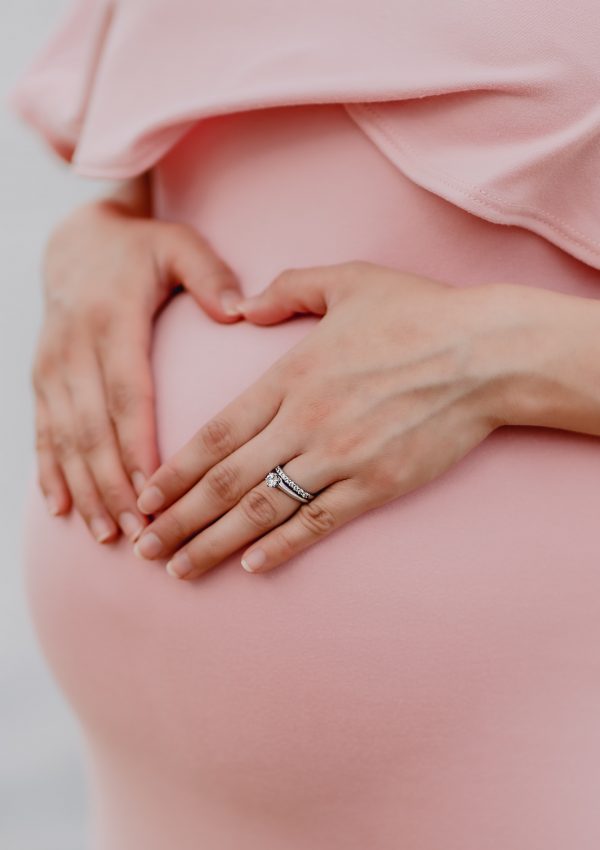Did you just get a positive pregnancy test and you’re wondering what to do next? Here are 11 things to do the second you find out you’re pregnant.
This post may contain affiliate links, which means I’ll receive a commission if you purchase through my links, at no extra cost to you. Please read full disclosure for more information.
First of all, CONGRATULATIONS on your big fat positive! Whether this was a planned pregnancy or it was unplanned and you’re ready for the journey, motherhood is the greatest blessing on the planet. I remember when I got my first BFP, my husband and I were over the moon!
Since there are a million things to do once you get a positive pregnancy test, there are a few things that are more important than others. You want to make sure you start as early as possible to nurture your growing baby and part of doing that means you need to take care of yourself! Here is a ‘not-so overwhelming’ list of tasks to do when you get that big fat positive.

This post is all about what to do as soon as you get a positive pregnancy test.
1. Retest
The very first thing you should do once you get your positive pregnancy test is RETEST. If you’ve read your results past the time allowance listed on the directions, there’s a chance you could have a false positive. This usually happens often for people who test early.
If you’ve been trying to conceive for a while I know the desire to be pregnant is real. But you want to make sure you’re taking the tests the right way to prevent being disappointed. The best way to do that is to read the results within 3-5 minutes.
If the second (or third, or fourth) test comes back positive, then congratulations!! You’re definitely pregnant.
2. Start taking a prenatal
Note: For any dietary supplement that you’re interested in trying, ask your doctor first. My recommendations work for me and may not be suitable for everyone. It’s best to research the products yourself before purchasing.
I cannot stress enough how important this is. If you weren’t taking a prenatal while you were trying to conceive (which I definitely think is a good idea) you want to start ASAP. The reason why you need a prenatal and not just any daily vitamin is because the prenatals have a lot of folic acid or folate, and other key nutrients for pregnant women such as: iron, calcium, vitamin D, B-complex, DHA (omega-3s), and iodine.
During the first few weeks of pregnancy, important organs such as the brain, neural tube, and spinal cord begin forming (crazy that it happens this soon right?!). Folate or folic acid helps support the growth of these integral organs.
Prenatal and DHA Recommendations
The prenatals I recommend are the Klaire Labs Prenatal & Nursing Formula, which is what I take, or the Thorne Research Basic Prenatal. My chiropractor recommended both and she specializes in treating pregnant women so she’s definitely credible. She also recommended the Nordic Naturals Prenatal DHA, which I take daily as well.
If you were to make a purchase using one of the links below, the vitamins are three capsules for a daily serving. The DHA, on the other hand, is two capsules a serving.
Klaire Labs Prenatal & Nursing ForMula

Thorne Research Basic Prenatal

NORDIC NATURALS PRENATAL DHA

3. Calculate your due date
Pregnancy is tracked based on menstrual weeks and takes place over the course of 40 of those weeks. For example, if it’s been 6 weeks since the start of your last period (assuming you haven’t had your period since then), you could be 6 weeks pregnant.
Calculating your due date is easy and also exciting! All you have to do is know the first day of your last period and your average cycle length. After that, you can enter that info into an online calculator like this one.
At your first prenatal visit, one of the first questions they’ll ask you is when your last period was. Even when you call to schedule an appointment, it might be one of the first things they ask you too. So it’s a good idea to have that info memorized or tracked on a cycle tracking app.
4. Find an OB-GYN or midwife
One of the best ways to find an OB or midwife is to first visit your family doctor. They can provide a good referral and you can ask them all the necessary questions before deciding on one.
Whether you prefer an OB-GYN or a midwife is up to you but just make sure you’ve done the research and like the practice. You want to make sure you’re confident in the care you’re receiving and comfortable with the doctor delivering your baby!
Also, you want to make sure you go through your insurance. Trust me, nobody needs healthcare costs piling up when you have a baby on the way! If you don’t have insurance, try to look for a local women’s health clinic. They should have plenty of care options for you to choose from.
To ensure that you choose the right provider for you, helpful tips are:
- Reading reviews
- Ask family and friends about the practices they go to
No matter who you choose, you always have the freedom to switch if it’s not the right fit.
5. Schedule a prenatal visit
Prenatal visits are very important for mom and the baby. Babies that are born to mothers that didn’t have prenatal care are up to 3x more likely to have low birth weight or birth defects.
Most practices won’t see you until you’re about 8-12 weeks along, which is almost a full trimester. For some, including myself, that’s a long time to wait, especially if it’s your first pregnancy. So that’s why I recommend looking for a practice that will see you for a confirmation of pregnancy visit.
The confirmation of pregnancy visit usually happens between 5-7 weeks. First, they will confirm your pregnancy with a urine test. If that comes back negative, they can do a blood test. Lastly, they might do an ultrasound that checks for things like an ectopic pregnancy.
If you are comfortable waiting until the 8 to 12 week mark, or you don’t have a history of high-risk pregnancies, there is no harm in that. Remember, 8 weeks pregnant means it’s been 8 weeks since the start of your last period.
6. Start tracking your pregnancy
The What To Expect app (Apple iOS and Android) is one of the best ways to track your pregnancy. It’s also fun! It will tell you how big your baby is getting week-by-week and it will also tell you about all the different things happening in your belly. There’s a video with each weekly update and they’re fun to watch. It’s a miracle that all of this takes place in 9 months!
7. Kick bad habits like smoking, drinking alcohol, and doing recreational drugs
You’ll want to stop smoking, drinking alcohol, and doing recreational drugs as soon as you find out you’re pregnant. All of these activities can increase your risk of miscarriage and can present many serious issues for you and your baby. It’s best to stop them completely and reach out to your doctor or midwife if you need help!
8. Curb saunas and hot baths, raw or undercooked food, fish with mercury, and certain pain medications

- Fish that may contain mercury like shark, swordfish, king mackerel, and tilefish are best avoided.
- Certain pain medications like Asprin, Ibuprofen, Aleve, and Motrin, you should stay away from. Tylenol is generally considered safe for pregnant women, but of course ask your doctor first.
- Soil and cat litter can contain harmful toxins and parasites so they’re best to stay away from. Be sure to wash veggies before eating and wear gloves if you’re a gardener.
- Hot tubs and saunas are best to avoid because you can easily overheat. If you’re hot, the baby is also hot. Regular baths are generally safe and relaxing as long as they’re not too warm.
- Foods that contain any bacteria or parasites:
- Unpasteurized juices like kombucha
- Raw meat, raw fish, and raw shellfish like sushi, ceviche, and oysters
- Soft cheeses like brie, blue, goat, and feta
- Deli meats like salami and ham
9. Limit caffeine
Experts say that up to 200mg of caffeine a day is safe and that’s about a regular cup of coffee. If lattes are more your speed, stick to the grandes, which usually have 2 shots of espresso. Some women prefer decaf, which satisfies the coffee craving with way less caffeine.
10. Exercise and stay active

EXERCISE! Yes, you’re going to want to rest when you can but if there’s one thing I wish I did more before I got pregnant it’s exercise. Pregnancy can be hard on your body and being in shape is one of the best ways to manage all the changes you’re going through.
General guidelines are that if you were very active before pregnancy, you can continue doing so.But if you find yourself not being able to talk through your workouts, you may want to tone down the intensity. If you sweat more, drink more water.
Some recommended forms of exercise during pregnancy are:
- Walking
- Stationary biking
- Yoga
- Swimming
- Low impact aerobics
11. Stay hydrated

Drink PLENTY of water! Staying hydrated is very important during pregnancy. Your body needs the extra fluids to create the amniotic fluid, pump more blood, flush out toxins, and more. They say you should drink at least half your bodyweight in ounces.
I suggest buying a huge water jug and filling it up twice a day at least. I love the Nalgene ones and I’ve been using it for years. It’s 32oz, which is amazing because you don’t have to refill it often.
NALGENE BPA FREE TRITAN WIDE MOUTH WATER BOTTLE

These are the most important things to do as soon as you get a positive pregnancy test! Is there anything you’ve found helpful? Let me know in the comments!
This post showed you 11 things to do once you get a positive pregnancy test.




